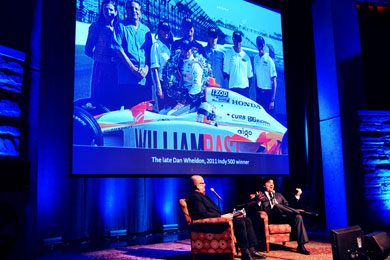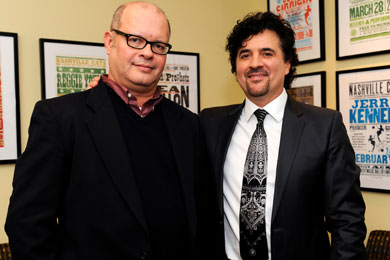
Scott Borchetta visited with Country Music Hall of Fame and Museum writer and editor Michael McCall this past weekend (Sat., Jan. 21) in a public series at the Museum’s Ford Theater to discuss his career growth and success in the music industry.
MusicRow was in attendance for the event along with many industry players, college students, and a number of Borchetta employees who he referred to as ‘machinists’ including his wife Sandi Spika, John Zarling, Allison Jones, Andrew Kautz, Kelly Rich, Matthew Hargis, Nikki Burns, Erik Powell and Jake Basden.
Borchetta is perhaps best known for breaking Taylor Swift and The Band Perry, and his contributions to the careers of superstars Toby Keith, George Strait, Rascal Flatts, Garth Brooks, Martina McBride and Reba. For these reasons, Borchetta has been included among 92 new entries in the second edition printing of The Hall’s Encyclopedia of Country Music, available on Feb. 1.
A majority of the session was spent discussing his resume, and sharing opinions and predictions for the industry. Notably, Borchetta quipped when asked where the music is headed: “it’s going straight to your heart.” A theme that seemed to thread throughout the afternoon was to stay true to yourself; follow your gut.
“We love what we do,” said Borchetta. “I don’t feel like I’ve ever given up anything in my life to do this. This is my life, and we love doing it. If you don’t love doing it, somebody will beat you because they love it more. Love what you do, and outwork everyone.”
When Scott moved to Nashville to join his father Mike, he jumped into a country band on a dare. Music City exposed the Southern California boy to a new music scene—one to which he was unaccustomed. “I wised up very quickly to the amazing level of talent in Nashville. It was the first time I saw what I thought were truly gifted musicians. There’s a difference when you’re a practicing musician and you’re in the presence of a gifted musician. A bell goes off. But one thing that happened, I became able to explain the business to musicians.”
Borchetta grew that business ability and gained a reputation around 1989-90 for promoting edgier country, working with Marty Stuart, Dwight Yoakam, and Kelly Willis, which earned him an invitation to work at MCA. “When I came, MCA had great executives but needed a culture of winning. The program needed a spark, and I think I brought that.”
It wasn’t just his drive that pushed the label forward, however. MCA gained the ability to be trusted by radio. “At the end of the day records and radio want the same thing: answers. Is this going to work? The momentum from George and Reba gave MCA more opportunity to be trusted by the gatekeepers at radio to really start forest fires with the listeners and fans for newer acts.”
When Borchetta’s time at MCA ended, he aligned with James Stroud, who was starting DreamWorks Nashville for David Geffen and Mo Ostin. Borchetta had a vision of creating another imprint for DreamWorks, which would allow the label to compete with RCA and MCA, and he began building a business model. That plan was shelved when DreamWorks in LA decided to sell out to Universal Music Group, home to MCA Nashville. Borchetta found himself SVP of Promotions and Artist Development at the label he had been working at a few years prior. Nonetheless, he pocketed a few lessons from his work with the DreamWorks roster.
Borchetta notes, DreamWorks hadn’t fully understood Toby Keith’s commercial appeal, but when they did, he exploded. “He was like a new Hank Jr., a country rock star. Toby eventually got so big that DreamWorks was unable to keep a balance and it hurt the label dramatically. When Taylor got so big, we knew we needed to keep a balance.”
“The things we learned with Jessica Andrews [at DreamWorks] had a lot to do with how we broke Taylor. For one, we found she had a teenage audience very excited about country music.” Jimmy Harnen, then in promotions at DreamWorks, suggested engaging this audience with shows at high schools. “Nothing too extraordinary, it just came out of paying attention. And we saw it just light up. A lot of the things we learned, we put into play with Taylor from day one. Jessica wavered between wanting to be a pop artist and a country artist. A lot of artists that young don’t have the focus, that’s whats so extraordinary about Taylor. She had that drive.
“Mergers are tough,” Borchetta said about the shift back to MCA after DreamWorks sold. “I don’t think bigger is better. Fewer isn’t better for the creative community. I’ve never thought fewer radio stations or record labels were better. Greatness is about identifying great talent, but what I think is great, other label heads Mike Dungan, Luke Lewis, or Gary Overton might hate. People just need more opportunities.”
In 2004, Borchetta met Taylor, and she waited for him to start Big Machine after he exited Universal. “We had a real vision and a direct goal for what we wanted to do. It just started happening, I put up my own money in the beginning, Toby put money in, and we were able to get Big Machine launched. There were a lot of disbelievers.

Mike McCall with Scott Borchetta discussing the impact the late race car driver Dan Wheldon made on his life
“If you haven’t done this, I encourage everyone to do it at least once, put everything on the line and see how good you are. You will reach down and find things in yourself that you didn’t know you had. I found people that were willing to put it on the line with me. We put blinders on and didn’t look back, we looked straight ahead. Talk about feeling alive and living like you were dying.”
Borchetta explained the success of his label is the diversified talent and the agility to move quickly where larger labels are unable. “We made sure our label wasn’t just about Taylor, we found balance with Garth and shortly after, Trisha, and Reba. We broke The Band Perry and we’re able to treat every artist individually.”
Breaking acts while continuing to promote established superstars seems to be at the crux of his business model. “Don’t ever take these amazing artists for granted. You know their names because they’re extraordinary. They didn’t one day stop being extraordinary. Something stopped happening and someone stopped caring. Maybe that artist or maybe the people around them, but you have to cut through and stay relevant and understand and accept that things change.
“The industry is going to change. We’ve got to do a better job at harnessing our whole digital platform. It’s out of control, but people haven’t fallen out of love with music, they’ve just fallen in love with new ways to use it. There’s no value in us fighting that, we have to accept it and figure out what other services to provide an artist. I love Spotify as a consumer, but as a businessman I hate it. It’s literally fractions of pennies and its really hard for a new artist to survive. We’ve got to make a lot of noise by figuring out how to get the attention if you’re playing video games or on Facebook all day. But when we get it, the artist better be ready.”
And as swiftly as he addressed his intentions to sell his empire a few months ago in an appearance on CNBC, Borchetta eloquently stated, “Predominantly, I’m un-hirable. I have a house. I have a car. I don’t know that you could throw a bunch of money and we’d give up what we’ve got. Right now, I’ve not seen anything that excites me more than what we do. We are always looking at opportunities, but it would have to be pretty extraordinary for us to change our mind.
“And for the Taylor fans, we’ll have a new record out in October.”

Category: Exclusive, Featured, Label, Organizations, Weekend
About the Author
Eric T. Parker oversees operations and contributes editorial for MusicRow's print magazine, MusicRow.com, the RowFax tip sheet and the MusicRow CountryBreakout chart. He also facilitates annual events for the enterprise, including MusicRow Awards, CountryBreakout Awards and the Rising Women on the Row. eparker@musicrow.com | @EricTParkerView Author Profile



